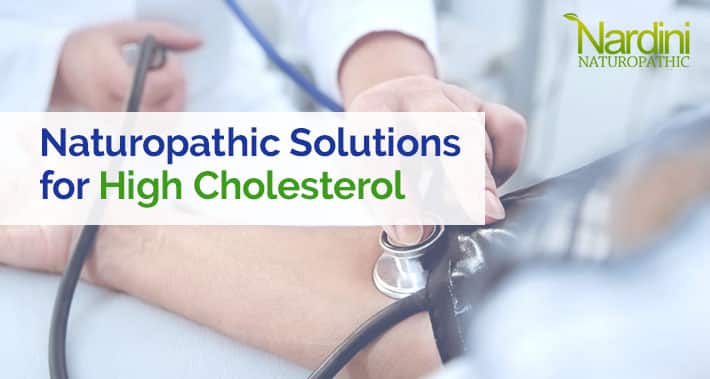Heart Health.
Those two words are everywhere these days.
And for good reason, as heart disease is one of the leading causes of death in Canada and the USA.
This is one of the reasons why taking care of your cardiovascular health is important, and this includes being aware of your cholesterol levels, and taking action if they are out of balance.
Today we are going to look at the different types of cholesterol, the risks and benefits associated with it, and ways to manage high cholesterol naturally.
What Is Cholesterol?
The way it is talked about in the media, you might start to think cholesterol is an inherently evil substance.
However, at normal levels, cholesterol plays an important role in the body, and has functions related to digestion, hormone production, and generation of vitamin D.
Good Cholesterol And Bad Cholesterol
There are two types of cholesterol.
Low-density lipoprotein (LDL) is also known as “bad” cholesterol, and high-density lipoprotein (HDL) is “good” cholesterol.
LDL got the “bad” label because at high levels, it builds up in your arteries, which leads to many cardiovascular disorders. HDL, on the other hand, carries cholesterol from the various parts of your body to your liver, which scrubs it from your bloodstream.
Health Benefits of Cholesterol
Cholesterol has a number of functions in the body, which help us to survive.
These functions include contributing to the structure of cells, producing digestive bile in the intestines, production of vitamin D, and production of hormones.
However, too much cholesterol comes with health risks.
Causes Of High Cholesterol
Sometimes, the cause of high cholesterol is that too much is taken in through the diet.
Diets which are high in saturated and trans fats are often also high in cholesterol.
Limiting foods such as meat, cheese, dairy, chocolate, baked goods, fried, and processed foods can help to manage cholesterol levels.
People who are overweight or obese commonly have higher LDL levels in their blood. Poor blood sugar control, which is associated with obesity, is often a factor.
Additionally, high cholesterol levels can be genetic, or develop due to conditions such as diabetes, liver disease, polycystic ovary syndrome, pregnancy, under active thyroid, and use of certain drugs.
Health Risks Of High Cholesterol
People who have high cholesterol are at higher risk for heart disease, heart attack and stroke.
These are all due to the buildup of plaque in the arteries, and the effects of a lack of blood flow (and therefore oxygen) to the vital organs such as the heart or brain.
Naturopathic Treatments For High Cholesterol
There are a number of ways which you can treat high cholesterol naturally, which many people prefer over the use of pharmaceuticals, which can have side effects, including headache, muscle aches, abdominal cramping, and nausea.
Below, we will discuss some of the options you may want to consider.
1. Dietary Changes
This is probably the most obvious way to tackle the issue of high cholesterol, seeing as much if it comes from diet.
Avoiding foods with “trans” fats, such as processed meats and dairy, which contribute to cholesterol production, is important.
Additionally, excess sugar and high-fructose corn syrup levels should be limited, as sugar can be one of the most potent contributors to excess cholesterol.
Other foods which can help balance cholesterol include cold-water fish, omega-3 oils, vitamin C, and garlic.
2. Regular Exercise Routine
Exercise is another important aspect for controlling cholesterol levels.
Not only can exercise assist with maintaining a healthy body weight, aerobic exercise has been shown to help control cholesterol levels.
Additionally, exercise helps to maintain cardiovascular health.
3. Supplement With Vitamin B3
Vitamin B3 supplementation can be used to raise the HDL (good) cholesterol and lower LDL (bad) cholesterol levels.
There are a couple of side-effects to watch out for, however, including skin flushing, nausea, and gastric irritability.However these can usually be mitigated by taking it with food, or flushing with water.
4. Increase Consumption Of Fiber
Foods which are rich in fibre such as vegetables, fruits, seeds, nuts, and legumes can help lower cholesterol levels.
Because fibre is indigestible, it acts to slow absorption of fats and sugars in the intestines.
5. Coenzyme Q10 Supplements
A 2010 study in the Ochsner Journal showed Coenzyme Q10 binds to LDL cholesterol and prevents it from causing damage to cell membranes1.
The binding of LDL cholesterol may also play a role in preventing fatty deposits from forming in arteries.
Call Nardini Naturopathic
Are you worried about your cholesterol levels?
If you think you might have to worry about cholesterol, due to your diet, weight, or any of the other factors which can contribute to high cholesterol, contact Nardini Naturopathic today.
You’ll get a change to sit down with me, Dr. Pat Nardini, where we’ll work together to determine the best naturopathic solutions to help manage your cholesterol levels.
Call today for a free 15-minute health clarity consultation.
If you have questions about naturopathic medicine, or you’d like to take your first step into the world of naturopathy, contact us at Nardini Naturopathic, and let’s book an appointment.
Yours in health,
Dr. Pat Nardini, Naturopathic Doctor
320 Danforth Ave suite 206,
Toronto, ON, M4K 1N8
-https://g.page/NardiniNaturopathicDanforth
Dr. Pat Nardini, ND is a licensed doctor of naturopathic medicine in Toronto, Ontario. He offers science based natural health solutions with a special focus on thyroid conditions.
